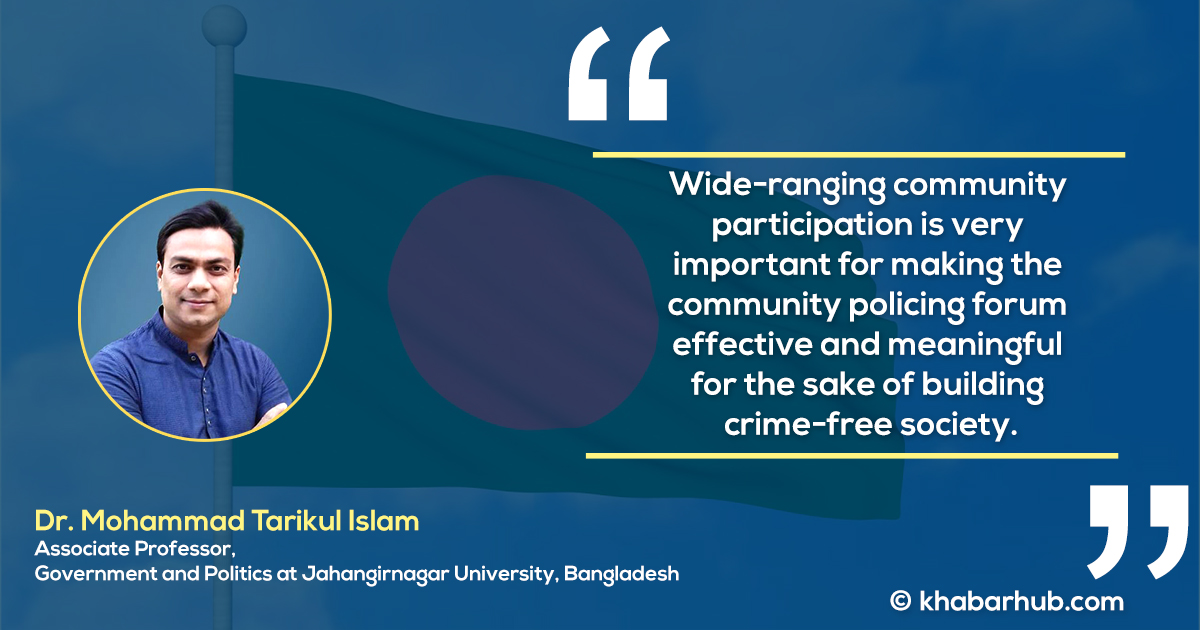Community policing is a relatively new but innovative concept in Bangladesh. It is a peace-loving nation and is manifested in our constitutional commitment to the general and complete disarmament.
Since its emergence as an independent nation in 1971, Bangladesh has always been a pioneer in the South Asian Region for the cause of global peace and disarmament.
Movement of community policing does not get pleasant appearance across the level rather remains less effective, to some extent although it is perceived as a potential force to be flourished as an effective force to resolve community-level problems and promote social justice.
A collaborative effort between the community police and Union Parishad has an essence to identify problems of crime and disorder as this innovative approach involves all elements of the community in the search for solutions to these problems.
Although community policing does not get momentum across Bangladesh, given the prevailing unrest and unsteady scenario in the community, community policing deserves utmost precedence across levels.
Community-oriented policing (COP) reshapes traditional police management and operational strategies through the facilitation of collaborative working relations between citizens and police.
Police along with the United Nations, NGOs and Community Based Organizations are on a frank attempt to bring the community and the police together in resolving problems prevailing at the community level aimed at ensuring social peace and stability.
Although community policing does not get momentum across Bangladesh, given the prevailing unrest and unsteady scenario in the community, community policing deserves utmost precedence across levels.
Union Parishad, the lowest tier of the local government is mandated to ensure peaceful resolution and amicable settlement of inter ward disputes as well as promote social resistance over violence against women, terrorism, all types of crimes and cooperate with the administration for maintenance of law and order.
Union Parishad could facilitate the successful execution of community policing for the promotion of social peace and stability.
For the poor, women, and other marginalized populations to benefit from economic opportunities, their basic rights must be secure in the home, community, and workplace, and they should have confidence in the commitment of law enforcement agencies to protect their rights and interests and be ready to lend their support for safer communities.
A key initiative involving the police was the police initiated community-based policing in Mymensingh. This innovative approach was initiated by senior police officials posted at Mymensingh District Police Headquarters in the early 1990s in response to the poor law and order situation existing in the area.
The numbers of the members of the committees formed at each level should not exceed 21. Community members from all walks of the society have been included in the CPFs.
In 1992, community-based policing in a form of Town Defense party (TDP) activities commenced and continue today as a model of proactive policing.
The strategy is based on the principle of the police and the community finding solutions together not only in response to current problems but also as a pre-emptive measure.
The initiative is fully owned by the police and the community, decisions are taken jointly and funds are locally raised to support the activities.
In policing a liberal democracy, with a diverse and energetic population, there are two broad strategies available to the police executive; the community policing approach and the law and order enforcement approach.
These two are not so many exact opposites as they are points on a continuum. Community policing encompasses a variety of philosophical and practical approaches and is still evolving rapidly.
Community policing strategies vary depending on the needs and responses of the communities involved; however, certain basic principles and considerations are common to all community policing efforts.
A strong emphasis is placed on crime prevention and community engagement.
Model Thanas are established in metropolitan and rural areas to demonstrate how community policing can benefit the community and ensure their needs and expectation can be met.
These Thanas are dedicated to delivering pro-people policing services in their engagements with the local community.
Police community consultation is a process to assist Bangladesh Police to engage the community in crime prevention and community safety through community policing.
In Bangladesh, there is a three-tiered local government system where the elected Union Parishad (UP) constitutes the base.
Each UP constitutes nine wards. Bangladesh police have taken up the wards as the basic units to implement community policing.
By creating space and opportunities for citizens and police to discuss their respective views, expectations and matters of common interest, COP helps to make police more responsive to citizen interests.
The Community Policing Forums (CPFs) set up at the ward level have been performing the core functions of the community policing system in Bangladesh.
There are two types of committees at the ward level- the executive committee and the other is the advisory committee.
The ward committee and CPFs are overseen by a coordination committee at the UP level. At the police station, there is a Thana coordination convening committee and in the district, there is a district- coordination committee.
The numbers of the members of the committees formed at each level should not exceed 21. Community members from all walks of the society have been included in the CPFs.
At all levels of community engagement, 33% representation of the women is also ensured. The CPFs are expected to be run, managed, and funded by the community members.
A Community Policing Officer (CPO) coordinates the activities of the CPF.
Community policing works as a vehicle to build peace and ensure safety and stability in society. In many respects, it presents goals, values, and practices that are consistent with restorative justice ideals.
Community policing purports to resolve problems and prevent crime and expects that crime will more likely be solved by an intimate knowledge of the community.
There are many conundrums embedded in these beliefs. Although members of a community may be willing to work with police to ensure that problems are resolved and even that offenders are apprehended and brought to justice, as arrests increase in communities, may communities become destabilized and residents’ attachments to communities weaken.
Wide-ranging community participation is very important for making the community policing forum effective and meaningful for the sake of building a crime-free society.
In the wake of the gradually rising trend of social crimes especially addiction to drugs and its trafficking and trading, they viewed only the law-enforcers or any other single organization that isn’t capable to uproot the crimes.
Collective efforts of police and community people could be streamlined through the leadership of Union Parishad at the grassroots level.
The lack of clarity in understanding of the Community Policing among the community may hold back the process of implementing community policing in our country.
Union Parishad as the elected and lowest body of the local government is responsible to ensure social peace and stability by the way of resolving local disputes.
The Union Parishad has two types of village police i.e. Dafadar and Mohalladar/ Chowkidar and the major functions of the Village Police are to assist the police in the investigation into and suppression of crimes and in arresting criminals; inform the officer in charge (OC) of the local police station about the state of law and order in every 15 days, and to inform the officer in charge (OC) of the local police station about those matters which might create riots or are potentially threatening situations to social peace and harmony.
While revisiting the major roles and responsibilities of village police of Union Parishad, it has been deceptive that, their duties counterpart the roles of community policing in rural Bangladesh.
By creating space and opportunities for citizens and police to discuss their respective views, expectations and matters of common interest, COP helps to make police more responsive to citizen interests.
Improved police services in turn nurture mutual trust and respect between police and members of the communities that they serve, promote improved communication and collaboration and contribute to increased public satisfaction with police services, all of which translate into safer communities.
Most communities, particularly, those located in remote areas of the country, still have serious reservations about working with a police service which has not proven itself to be either accountable or efficient in dealing with local issues regarding safety and security.
Local government institutions particularly Union Parishad need to be empowered with concrete responsibilities to supplement the efforts of community policing in a rural area of Bangladesh.
Interconnection between Union Parishad and community policing could trigger social peace and stability.
In an attempt to make an effective Union Parishad deliver favorable services for promotion of community policing, respective jurisdictions of MPs, central government and local government have to be urgently redefined in a clear and specific manner to free the UP from political interference.
Unfortunately, persistent political and administrative interference in the Union Parishad affairs has made it ineffective particularly in maintaining law and order situations in rural Bangladesh.
The lack of clarity in understanding of the Community Policing among the community may hold back the process of implementing community policing in our country.
To this end, police and general people are supposed to meet one another at the different meetings, so that civilians will know who is working in their area and police will learn who the “good people” are in their area.
In an attempt to make an effective Union Parishad deliver favorable services for promotion of community policing, respective jurisdictions of MPs, central government and local government have to be urgently redefined in a clear and specific manner to free the UP from political interference.
The UP has to perform many other functions excepting 48 assigned functions. Therefore, decentralization in UP functions is essential.
Each ward member will be delegated with certain functions to be performed within his/her ward for the sake of social peace and stability.
The holding of progress meetings between the community policing committee and the Union Parishad has to be made mandatory.
Union Parishad has to be capacitated with monitoring and evaluation of the performance of community policing at the local level.
Once these are achieved, police service will be more effective in their fight against crime as well as their struggle for positive acknowledgment from both the general community and police management and employers.
Dr. Mohammad Tarikul Islam is an Associate Professor of Government and Politics, Jahangirnagar University in Bangladesh.









Comment